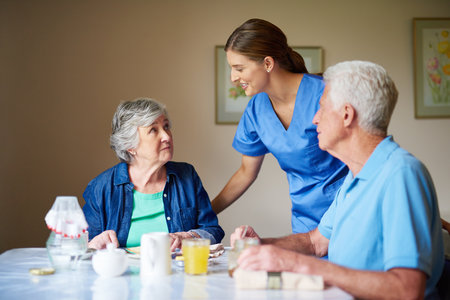Understanding the Importance of Self-Care and Hygiene in Later Life
As we grow older, maintaining self-care and personal hygiene becomes increasingly vital for our overall well-being. Within the UK, where the elderly population is steadily rising, supporting these daily routines not only preserves physical health but also upholds dignity and fosters a sense of independence. Self-care activities—such as bathing, grooming, and dressing—are more than just practical tasks; they represent moments where elderly Britons can exercise autonomy and make personal choices. Good hygiene helps prevent infections and skin conditions that can quickly escalate among older adults, especially during colder British winters when vulnerability to illness increases. Furthermore, feeling clean and well-presented has a profound impact on self-esteem, which is essential for mental health and quality of life. In many British communities, there is a strong tradition of “keeping up appearances” and taking pride in one’s presentation, regardless of age or circumstance. Therefore, understanding the importance of self-care and hygiene goes beyond medical necessity—it is about nurturing respect, confidence, and a continued connection to cherished routines that shape everyday living for elderly Britons.
2. Identifying Common Barriers Faced by Elderly Individuals
Many elderly Britons encounter a variety of challenges that can make self-care and personal hygiene increasingly difficult. Understanding these barriers, both visible and less apparent, is a vital step in providing effective support and fostering dignity among older adults.
Physical Barriers
The ageing process often brings about changes that directly impact day-to-day activities. Reduced mobility, chronic pain from conditions such as arthritis, or the aftereffects of strokes are common in the UK’s older population. These physical limitations may make it hard to use a shower safely, get in and out of the bath, or manage buttons and zips when dressing. Furthermore, sensory impairments like diminished eyesight or hearing loss can add complexity to routines that were once straightforward.
Examples of Physical Challenges
| Challenge | Impact on Self-Care |
|---|---|
| Arthritis | Painful joints hinder bathing, brushing teeth, and hair care. |
| Limited Mobility | Difficulties with standing for long periods or reaching high shelves. |
| Vision Loss | Trouble identifying toiletries or reading instructions on medication. |
Emotional Barriers
Mental health is equally crucial. Feelings of loneliness—a well-documented issue among elderly people in Britain—can sap motivation to maintain daily routines. Depression and anxiety may also cause individuals to neglect their hygiene or withdraw from social activities. The fear of slipping in the bathroom or being judged for needing help can further discourage attempts at self-care.
Emotional Factors Affecting Hygiene
- Lack of confidence due to recent falls or hospital stays
- Shame or embarrassment about needing assistance
- Bereavement leading to apathy toward personal appearance
Societal and Environmental Barriers
The structure of society and the environment plays a significant role. Many British homes were not designed with accessibility in mind, meaning stairs, narrow doorways, or outdated bathrooms present real obstacles. Limited access to community services—especially in rural areas—can leave older adults isolated from professional help or social opportunities that encourage regular self-care.
Societal Influences in the UK Context
- Lack of accessible transport to reach local amenities or clinics
- Cultural emphasis on privacy making it hard to ask for help
- Austerity measures impacting availability of homecare services
Conclusion
Recognising these multifaceted barriers—physical, emotional, and societal—is essential for developing sensitive strategies tailored to the unique circumstances of elderly Britons. By understanding the specific challenges faced within the UK context, families and caregivers can offer more compassionate support while empowering older adults to retain as much independence as possible.

3. Practical Support Strategies for Self-Care
Supporting self-care and personal hygiene in elderly Britons requires a thoughtful, respectful approach that places independence at the forefront. Many older adults prefer to remain as self-reliant as possible, and gentle encouragement can go a long way. It’s important to focus on empowering rather than taking over, which can help preserve dignity and boost confidence.
Encouraging Independence with Kindness
A gentle reminder or offer of assistance can be far more effective than direct intervention. For example, setting up a daily routine together—perhaps with the help of a familiar diary or wall calendar—can provide structure while respecting an individual’s preferences. When offering support, use polite language such as, “Would you like some help with this?” or “Let me know if you’d like a hand.” This approach aligns with the British value of privacy and autonomy.
Assistive Devices for Everyday Tasks
Modern assistive devices can make daily activities easier and safer without removing a sense of accomplishment. Items such as long-handled sponges for bathing, easy-grip cutlery, or sock aids are simple yet effective tools that promote independence. In British homes—often featuring compact bathrooms and narrow staircases—choosing equipment that fits comfortably is essential. Grab rails in the loo or shower, non-slip mats, and adjustable-height chairs can seamlessly blend into traditional British interiors.
Home Modifications That Respect Familiar Spaces
Adapting the home environment should always be done with sensitivity to both function and aesthetics. Consider subtle changes such as improved lighting in hallways, lever-style door handles for arthritic hands, or raised electrical sockets to reduce bending. These modifications ensure safety while maintaining the cherished character of British homes, allowing elderly individuals to continue enjoying their familiar surroundings with confidence and comfort.
4. Promoting Personal Hygiene with Sensitivity
Supporting older adults in maintaining personal hygiene is essential for their comfort, dignity, and overall wellbeing. In the UK, respect for privacy and individuality is highly valued, making it important to approach this aspect of care with particular sensitivity. Here are some strategies for honouring preferences and cultural habits while encouraging good hygiene practices among elderly Britons:
Understanding Personal Preferences and Routines
Each person has unique routines and preferences shaped by a lifetime of experiences. Taking time to learn about an individual’s favourite products, preferred bathing times, or methods can make a significant difference in their willingness to participate in self-care.
| Aspect | Considerations | Suggestions |
|---|---|---|
| Bathing Frequency | Some older Britons may prefer a traditional weekly bath over daily showers. | Respect chosen frequency; supplement with gentle washes on non-bathing days. |
| Product Choices | Familiar British brands and scents can evoke comfort and reassurance. | Ask about favourite soaps or shampoos; stock familiar products where possible. |
| Privacy Needs | Dignity in personal care is paramount in UK culture. | Use towels or robes to cover exposed areas; always explain each step before proceeding. |
Encouraging Independence While Offering Support
Fostering a sense of autonomy can boost confidence and motivation. Where possible, provide adaptive equipment such as grab rails or long-handled sponges, allowing individuals to do as much as they can independently. Gentle encouragement—phrased positively—can help without feeling intrusive.
Examples of Supportive Phrasing:
- “Would you like me to help set things up and then give you some space?”
- “Let me know if youd prefer to do this part yourself.”
- “Is there a special way you like your bath run or towel folded?”
Cultural Awareness and Respectful Communication
Elderly Britons may have ingrained habits influenced by generational norms—for instance, using flannels (face cloths), having a cup of tea after bathing, or particular grooming rituals. Being aware of these customs helps create a supportive atmosphere where personal history is valued. Always ask before making changes to established routines and use polite, inclusive language that reassures rather than instructs.
5. Engaging Community and Local Resources
In the UK, a wealth of community-based initiatives and local resources are available to support elderly Britons with self-care and personal hygiene. Tapping into these networks not only helps older adults maintain their independence but also fosters social connection and overall wellbeing.
Local Council Services
Many local councils across the UK offer tailored support for older residents, including assistance with daily living tasks, home adaptations, and mobile bathing services. These council-run programmes can provide practical help such as grab rails, shower seats, and regular home visits from trained carers. Checking your local council’s adult social care website or contacting their helpline is a good first step to understanding what’s available in your area.
Community Initiatives
British communities often host events and activities designed to reduce isolation and promote healthy living among older people. Community centres may offer exercise classes, health checks, or group sessions on personal care topics. In some areas, “befriending” schemes pair volunteers with elderly individuals to provide companionship and informal support—sometimes even helping with shopping or personal grooming needs.
Voluntary Organisations
The voluntary sector plays a vital role in supporting elderly people with self-care. National charities like Age UK, Independent Age, and Royal Voluntary Service provide information, advice, and practical assistance—ranging from hygiene packs to home visits. Many local faith groups or grassroots organisations also run lunch clubs, drop-in sessions, or outreach programmes where older adults can access help in a friendly environment.
Bringing it Together
Encouraging elderly loved ones to engage with these community resources can significantly enhance their ability to care for themselves. Whether through council services or voluntary organisations, these supports not only address practical needs but also nurture a sense of belonging—a cornerstone of British life that is especially meaningful in later years.
6. Encouraging Routine and Emotional Well-Being
Establishing gentle routines can provide elderly Britons with a sense of stability and purpose, fostering both physical health and emotional resilience. Begin by suggesting activities that are not only manageable but also resonate with familiar aspects of British culture. For example, encouraging a morning cup of tea in the garden or by a sunny window can offer moments of mindfulness and comfort. Gentle walks in local parks, allotments, or even tending to window boxes allow for light exercise while connecting with nature—a cherished pastime in many communities across the UK.
Incorporating personal hygiene into daily rituals ensures these practices become effortless habits rather than overwhelming tasks. Setting regular times for bathing, grooming, and oral care—perhaps after meals or before settling down with the afternoon news—can help maintain consistency without feeling intrusive. It is also helpful to use reminders that blend seamlessly into daily life, such as keeping toiletries organised in easily accessible places or using visual cues like checklists adorned with familiar British motifs.
To support emotional well-being, encourage participation in community activities where possible. Many local libraries, faith groups, and village halls offer social clubs, craft sessions, or gentle exercise classes tailored for older adults. These gatherings provide opportunities for connection, laughter, and shared memories. For those who prefer quieter pastimes, puzzles, crosswords from The Times, or listening to favourite BBC radio programmes can foster cognitive engagement and joy.
Above all, approach each day with compassion and flexibility. Celebrate small achievements—whether it’s taking a short walk despite drizzly weather or simply enjoying a chat with neighbours over the fence. By weaving gentle routines into everyday life and honouring the unique traditions of British living, we nurture not just hygiene and self-care, but also the heart and soul of our cherished elders.


